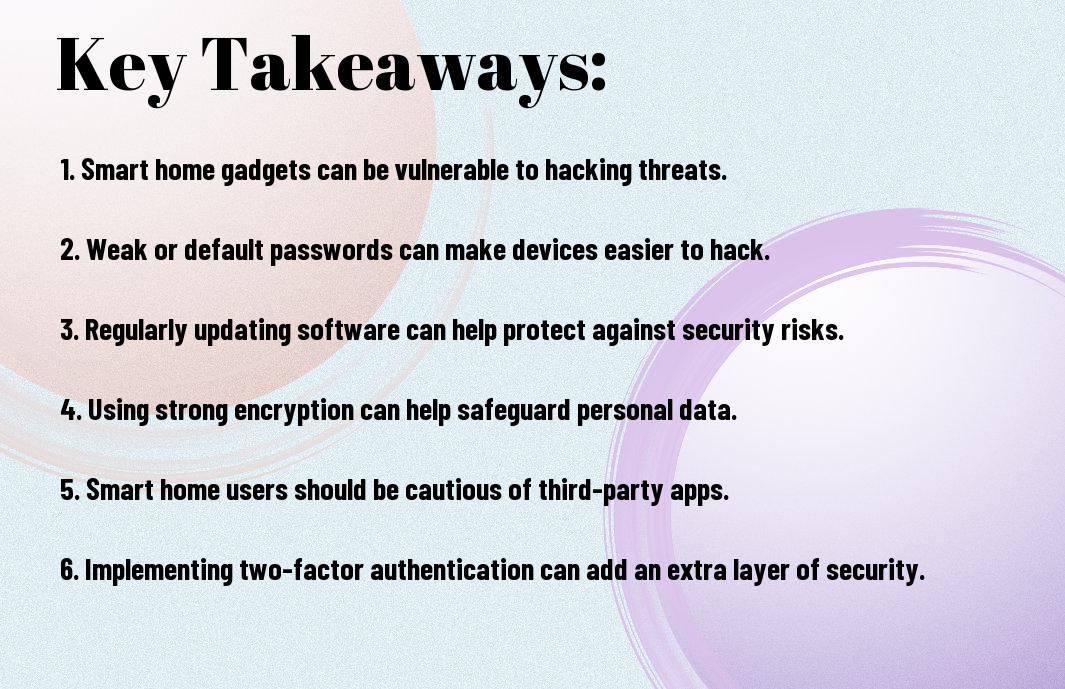As you integrate more smart home gadgets into your living space, it’s crucial to consider the potential security risks that come with them. While these devices offer convenience and efficiency, they also present opportunities for hackers to infiltrate your home network and access your personal information. With the rise of Internet of Things (IoT) devices, it’s more important than ever to protect your smart home gadgets from potential security breaches. In this blog post, we’ll delve into the security vulnerabilities of smart home gadgets and provide you with valuable tips on how to secure your home network from cyber threats.
Key Takeaways:
- Smart home gadgets are vulnerable to hackers: Many smart home gadgets lack proper security measures, making them susceptible to hacking attempts.
- Regular software updates are crucial: Manufacturers must consistently update their devices’ software to patch vulnerabilities and enhance security features.
- Strong passwords are essential: Users should always set unique and complex passwords for their smart home devices to prevent unauthorized access.
- Enable two-factor authentication: Adding an extra layer of security through two-factor authentication can significantly reduce the risk of hacking.
- Consider investing in a secure network: Using a secure network with strong encryption methods can provide an additional layer of protection for smart home gadgets.
Understanding the Risks
When it comes to smart home gadgets, security is a major concern. Understanding the potential risks associated with these devices is crucial in ensuring that your personal information and privacy remain protected.
Common Vulnerabilities in Smart Devices
Smart home gadgets are often vulnerable to common security weaknesses, such as unsecured Wi-Fi networks, outdated software, and default passwords. Hackers can exploit these vulnerabilities to gain access to your devices and potentially compromise your sensitive information. It’s important to regularly update your devices’ firmware and change default passwords to reduce the risk of exploitation.
Notable Hacking Incidents
There have been several high-profile hacking incidents involving smart home gadgets in recent years. For example, in a notable incident, a popular smart home security camera was hacked, allowing the perpetrator to access the camera feed and spy on unsuspecting individuals. This highlights the serious privacy implications of a compromised smart device. As a result, it’s essential to be aware of the potential risks and take proactive measures to safeguard your smart home gadgets.
Protecting Your Smart Home
When it comes to safeguarding your smart home from potential hackers, it’s crucial to take proactive measures. By implementing security best practices and staying informed about advances in smart device security technologies, you can minimise the risk of a security breach in your home.
Security Best Practices for Consumers
As a consumer, there are several security best practices you should follow to enhance the protection of your smart home. Start by regularly updating the firmware and software of your smart devices. Manufacturers often release security patches and updates to address vulnerabilities, so it’s important to keep your devices up to date. Additionally, create strong, unique passwords for each of your smart gadgets and consider implementing two-factor authentication where possible. It’s also advisable to segment your network, separating your smart home devices from your regular internet usage to mitigate the impact of a potential breach. Lastly, be cautious when granting permissions to third-party apps and services, and regularly review and manage these permissions to ensure your data is secure.
Advances in Smart Device Security Technologies
There have been significant advances in smart device security technologies to bolster protection against potential security threats. Manufacturers are increasingly incorporating robust encryption methods to secure the communication between smart devices and their associated apps. Furthermore, the integration of biometric authentication, such as fingerprint and facial recognition, adds an extra layer of security to smart home systems. In addition, the deployment of artificial intelligence and machine learning algorithms can help identify and predict potential security breaches, enabling proactive mitigation of risks. These advancements in smart device security technologies demonstrate a positive trajectory towards enhancing the overall security of smart homes.
The Role of Manufacturers
When it comes to the security of smart home gadgets, the role of manufacturers is crucial. It is their responsibility to design and produce devices that are secure from potential cyber threats. However, not all manufacturers take this responsibility seriously. Some may prioritise cutting costs over implementing top-notch security measures, leaving your devices vulnerable to hackers. Therefore, it’s essential to be aware of the manufacturers’ role in ensuring the security of smart home gadgets.
As a smart home user, you may be concerned about the security of your devices, and rightly so. One way to protect your smart home devices from cyber threats is to be cautious about the manufacturers you choose. Look for reputable brands with a track record of prioritising security in their devices. Consider seeking advice from online communities such as Reddit’s smart home community, where you can gain insights from other users on the best manufacturers for secure smart home gadgets.
The Need for Industry Standards
Industry standards play a critical role in ensuring the security of smart home gadgets. When manufacturers adhere to industry-wide standards for security protocols and measures, it significantly reduces the potential vulnerabilities in the devices. By choosing products that comply with recognised industry standards, you enhance the security of your smart home ecosystem. It’s crucial to look for products that meet standards such as.
Updates and Support Lifecycle
Manufacturers’ commitment to providing regular updates and long-term support for their smart home gadgets is vital for safeguarding against security threats. Devices that receive timely security updates and have a well-defined support lifecycle are less prone to vulnerabilities. When choosing smart home gadgets, consider the manufacturer’s track record in providing updates and long-term support. This ensures that….
“`html
Looking to the Future
As smart home technology continues to advance at a rapid pace, it’s important to consider the future of security in this sector. With the increasing interconnectedness of devices in the home, there are both emerging threats and innovations in home security that you should be aware of.
Emerging Threats
As technology evolves, so do the tactics of hackers and cybercriminals. With the growth of smart home gadgets, there is an increasing risk of these devices being targeted for malicious purposes. Vulnerabilities in the software and communication protocols of these devices can be exploited by hackers, putting your privacy and security at risk. It’s crucial to stay updated on the latest security threats and take proactive measures to protect your smart home from potential breaches.
Innovations in Home Security
On the bright side, there are ongoing developments in home security that aim to enhance the protection of smart home gadgets. From advanced encryption techniques to biometric authentication, there are innovative solutions being implemented to safeguard your devices and data. Companies are also investing in AI-powered security systems that can detect and respond to potential threats in real-time, providing an added layer of security for your smart home. It’s reassuring to see these advancements in the industry, giving you more peace of mind as you embrace smart home technology.
“`

Are smart home gadgets secure from hackers?
With these considerations in mind, it is important to take steps to ensure that your smart home gadgets are secure from hackers. This includes regularly updating the firmware on your devices, using strong passwords, and enabling two-factor authentication where possible. Additionally, be cautious about the third-party apps and services you connect to your smart home system, as these could potentially be avenues for hackers to gain access to your devices. By staying vigilant and proactive in securing your smart home gadgets, you can minimise the risk of falling victim to cyber security threats.
FAQ
Q: Are smart home gadgets secure from hackers?
A: Smart home gadgets can be vulnerable to hackers if not properly secured, but there are measures you can take to improve their security.
Q: What are the common security risks associated with smart home gadgets?
A: Common security risks include unprotected Wi-Fi networks, unsecure device passwords, and outdated software that can be exploited by hackers.
Q: How can I secure my smart home gadgets from hackers?
A: You can secure your smart home gadgets by using strong, unique passwords, enabling two-factor authentication, updating firmware regularly, and using a secure Wi-Fi network.
Q: What are the best practices for securing smart home gadgets?
A: Best practices include conducting regular security audits, setting up a separate network for smart devices, and being cautious about granting access to third-party apps and services.
Q: Can smart home gadgets be hacked remotely?
A: Yes, smart home gadgets can be hacked remotely if they are not properly secured, making it essential to take necessary precautions to protect your devices and data.
Q: What should I do if I suspect my smart home gadgets have been hacked?
A: If you suspect your smart home gadgets have been hacked, immediately disconnect them from the network, change the passwords, and update the firmware to prevent further unauthorized access.
Q: Are there any security certifications or standards to look for when purchasing smart home gadgets?
A: Look for smart home gadgets that comply with industry standards such as WPA3 for Wi-Fi security and have been certified by reputable security organisations to ensure they meet security best practices.








